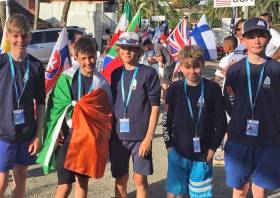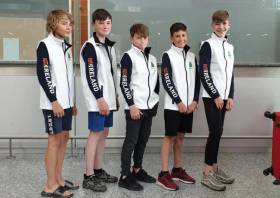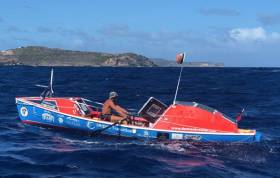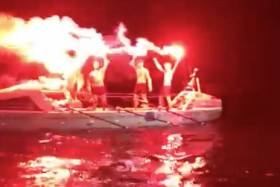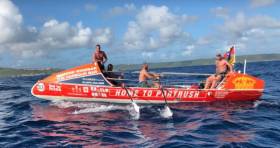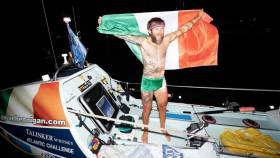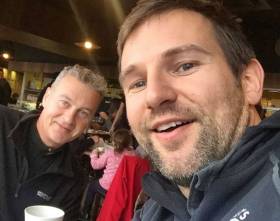Displaying items by tag: Antigua
April's Antigua Sailing Week is Cancelled
The 2021 edition of Antigua Sailing Week (ASW), including the Round Antigua Race, scheduled for April 24 – 30 has been due to COVID-19.
The timing of this decision for the cancellation was taken after in-depth consideration of the obligations participants have to charter companies, hotels and villa companies, shipping companies, and also taking into account international travel restrictions and an inability to organise an impenetrable bubble for the safety of all participants, volunteers and the wider community.
With its position as the anchor event of an already uneventful Caribbean racing season, interest in the event was strong. “With entries still coming in we were grappling with finding the right formula to accommodate those interests, but with the increased restrictions being put in place to manage the further spread of COVID-19, cancellation is the only possible outcome at this time,” stated ASW commercial director, Alison Sly-Adams.
She went on to say, "For over 50 years we have looked forward to hosting the return of new and old friends to ASW as much as the sailors look forward to the epic racing conditions. This cancellation, while being the right thing to do, hurts our sailing soul. We are truly excited to get back to what we love, the business of yacht racing, next year."
The cancellation of the 2021 event further compounds the financial blow to the non-profit entity which organises this internationally respected event, as well as to the greater local community. The staging of the event results in a positive economic impact for the destination to the tune of EC$6 million each year.
This is a giant loss to the economy of Antigua and to the yachting sector in particular.
Minister of Tourism and Investment, Charles Fernandez said of the cancellation: “We are disappointed to have to cancel the event for a second year. Not only is it very important to us as an economy, but for many of us, it is our favourite time of year when we come together as a community with our visitors to celebrate the wonderful yachting season. This year, however, as a destination we are prioritizing managing the health care system and the vaccination programme for the good of the community, which in the long term will allow us to welcome back our visitors safely. In fact, we have started planning for 2022 and intend to make it bigger and better than ever.”
Participants on the 2021 entry list can opt to have entry fees transferred to 2022.
Despite the cancellation, however, the Antigua and Barbuda Marine Association (ABMA) has moved to reassure visiting yachtsmen and women that despite the cancellation of iconic Antigua Sailing Week the yachting industry in Antigua and Barbuda continues to be open for business.
President of the ABMA Franklyn Braithwaite states, "Our marinas and supporting marine service businesses remain open and with our many anchorages around both islands it's possible to enjoy charters between both islands and there still be enough space to socially distance. The refit business, sail training operations including RYA keelboat and dinghy courses, MCA and STCW all continue year round."
Howth’s Rocco Wright Makes Top 10 At Optimist Worlds
Howth Yacht Club’s Rocco Wright scored a tremendous result for Ireland as he placed 10th in the Optimist Worlds in Antigua earlier this week.
He was followed closely in the final standings by 13th-placed James Dwyer Matthews of the Royal Cork/Kinsale in the event won by the new three-time champion Marco Gradoni of Italy.
The rest of the Irish team are also to be commended for their finishes in a field comprising 255 young sailors: Sam Ledoux (National YC) was 70th overall, Luke Turkey (HYC) 100th and Ben O’Shaughnessy (RCYC) 159th.
In the glow of that achievement for the nation, the International Optimist Dinghy Association of Ireland (IODAI) has decamped to Waterford Harbour for the Optimist Munster Championships from today, Saturday 29 July.
The event is open to all boats of the IODAI across Regatta, Junior and Senior fleets, with the Notice of Race, Sailing Instructions and Supplementary Instructions available on the Waterford Harbour Sailing Club website.
The International Optimist Dinghy Association Ireland (IODAI) shared a photo yesterday (Sunday 30 June) of the five-strong team headed to Antigua to represent Ireland at the 2019 World Championships later this week.
Rocco Wright (Howth YC), James Dwyer Matthews (Royal Cork/Kinsale), Ben O’Shaughnessy (Royal Cork), Sam Ledoux (National YC) and Luke Turvey (Howth YC) will be supported by team coach Dara O’Shea at the event, where racing gets under way this Saturday 6 July.
They will be hoping to best the European team’s impressive performance in Brittany last week, placing 11th overall in a field of 300 sailors representing 50 countries.
Atlantic Rower Damian Browne Arrives in Antigua to Big Welcome
#Rowing: Damian Browne has completed the Atlantic Challenge Rowing race. The big Galway man, a former professional rugby player, took 63 days to row from the Canary Islands to Antigua. He suffered through storms and capsizes and posted Facebook videos which showed the injuries he suffered. Rowing as Gulliver’s Travels, he was the final boat of the race to finish. He was greeted by a big group of green-clad Irish fans on land.
Relentless Rowers Set New Record
#Rowing: A crew from Cork and Dublin, Relentless, have set a new record for rowing the Atlantic for a Republic of Ireland team. Sean Underwood, Pat O’Connor and Eoin O’Farrell and Thomas Browne crossed the finish line in Antigua this morning after taking just 32 days, 22 hours and four minutes to row from La Gomera in the Canary Islands. They finished sixth in the Atlantic Challenge race, just over three days behind winners The Four Oarsmen, who became the fastest crew ever to row the Atlantic. Ireland had two good placings in the race: on Sunday, Northern Irish crew Home to Portrush finished one place ahead of Relentless in a time of 31 days eight hours and 57 minutes.
Home to Portrush Row Across the Atlantic
#Rowing: Home to Portrush rowed into English Harbour on Sunday to finish fifth in the Atlantic Challenge race from the Canaries. The crew of George McAlpin, Ally Cooper, Gareth Barton and Luke Baker took just a month to complete the race, which started on December 14th in La Gomera. They finished fifth overall. Organisers say their row took 31 days eight hours and 57 minutes, which was inside the previous best time for the race. They received a raucous welcome from family and friends on the dock when they landed.
Hennigan Wins Battle And Takes Third in Atlantic Rowing Race
#Rowing: Gavan Hennigan traversed the finish line in the Talisker Whisky Atlantic Challenge tonight and marked himself out as a record breaker. The 35-year-old Galway man took 49 days to complete the row from La Gomera in the Canaries to Antigua in the West Indies. He became the fastest Irishman to row across the Atlantic, less than half the time taken by Sean McGowan (118 days) on this route in 2010; he also beat the record set by Irish-born Briton Tom McClean, who rowed across the North Atlantic in 55 days in 1987.
Hennigan (35) won an exciting battle with the three-man American Oarsmen to take third of the 12 boats in the race. The American crew pushed hard over the final week and almost caught the Irishman. Though they covered impressive distances each day, Hennigan matched and even outpaced them.
The crew which won, Latitude 35, set a new world record. It had a four-man crew, as did the second boat to finish, Row for James.
Taking their places behind Hennigan are a four, three trios, two pairs and three solos.
Hennigan is not the fastest man to row solo across the Atlantic, as stated in one media outlet. In 2013, Charlie Pitcher became the fastest solo rower to cross the Atlantic in an open class boat: he crossed from La Gomera to Barbados in 35 days and 33 minutes. The statistics are available on oceanrowing.com.
What a wonderful achievement by Gavan Hennigan. When he said he thought he could complete the race in 50 days, I thought it was hugely ambitious for a first-timer. And then he beat it! Amazing.
You might be able to confirm something for me. Is he now the fastest solo rower over the La Gomera to Antigua course? And do you know where he ranks in the list of solo rowers to cross the Atlantic?
He told me you were a key part of the team he had ‘on land’. Well done to all!
Yours,
Liam Gorman, Rowing Correspondent, The Irish Times
00353 (0)86 8051830
Atlantic Rower Hennigan Sets Up Exciting Finish
#Rowing: After 5,000 kilometres of rowing, Gavan Hennigan is in a race to the line in the Talisker Whisky Atlantic Challenge. The three men of American Oarsmen are finishing fast, hoping to take third from the Irishman in the row from the Canary Islands to the West Indies. The American boat has been hitting remarkable numbers (93 nautical miles per day/172 km) but Hennigan retains a slight lead as the crews dash to the finish in English Harbour in Antigua. Both crews should finish late on Wednesday night or early on Thursday.
The race started on December 14th in the Canary Islands. Hennigan (35) is set for a new Irish record for a solo oarsman rowing across an ocean. The crew which won, Latitude 35, set a new world record. It had a four-man crew, as did the second boat to finish, Row for James.
Green Dragon Available For Charter at Antigua Week
Regular Afloat readers will recall Green Dragon's departure from Dingle in County Kerry crewed by sea scouts last year but now after debuting in new colours at last October's Middle Sea Race, the 2008/9 Irish Volvo Ocean Race veteran is sailing around the Caribbean and is available to charter.
Miramar Sailing based in Antigua has places available on Green Dragon at the forthcoming 49th edition of Antigua Sailing Week.
From Russia to Australia, yachts and crew from over 20 nations will be competing in the regattta.
Green Dragon was specifically built as the Irish entry in the 2008-2009 Volvo Ocean Race, in which she finished fifth of seven. In 2012 she took line honours in the Round Ireland Race.
Miramar sailing took delivery of the Irish yacht last September
The Volvo Ocean 70 (also known as the Volvo Open 70) is the former class of racing yachts designed for the Volvo Ocean Race. It was first used in the 2005–06 race (replacing the Volvo Ocean 60 yachts which were first used in 1993) and use a Canting keel which is capable of canting transversely up to an angle of 40 degrees.
2008 Irish Olympic Finn sailor Timothy Goodbody completed the Round Antigua race last Saturday covering the course of just over 50 nm in a Laser dinghy in a time of 10 hours and 48 minutes.
According to an Afloat.ie source, no dinghy has ever entered the race before, so the Irish helmsman from the Royal Irish Yacht Club in Dun Laoghaire picked up a "double" first for his efforts. The organisers have now set the time as a race record to be beaten.
Down the north side of the island Goodbody sailed through a sea of turtles in great big surfing rollers. He ran out of wind at the bottom of the island and then had a long beat to the finish line in Falmouth Harbour. Goodbody reckons with the right conditions it could be done in approx nine hours.
He carried a VHF, EPIRP, GPS and about 10 litres of water for the circumnavigation.



























